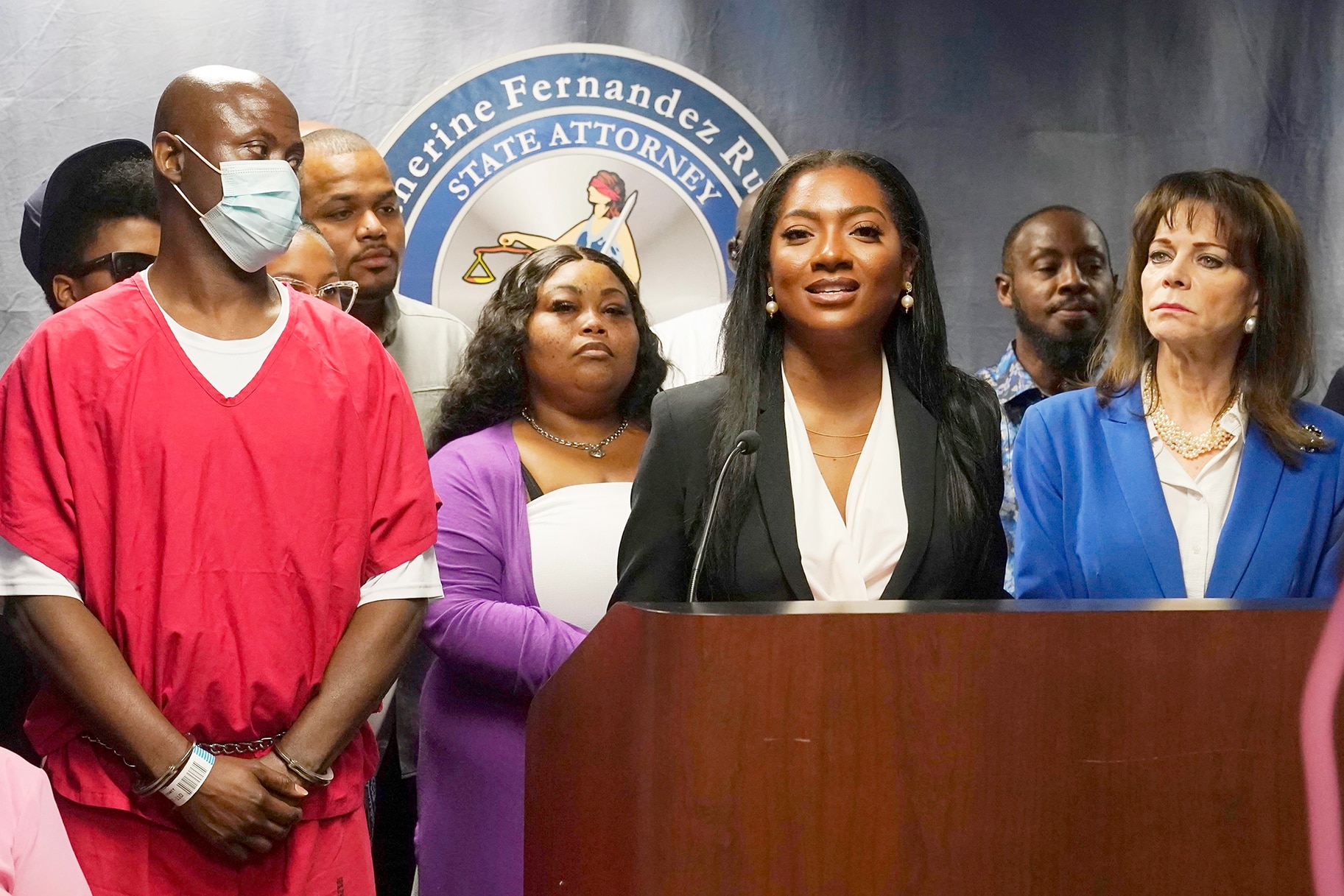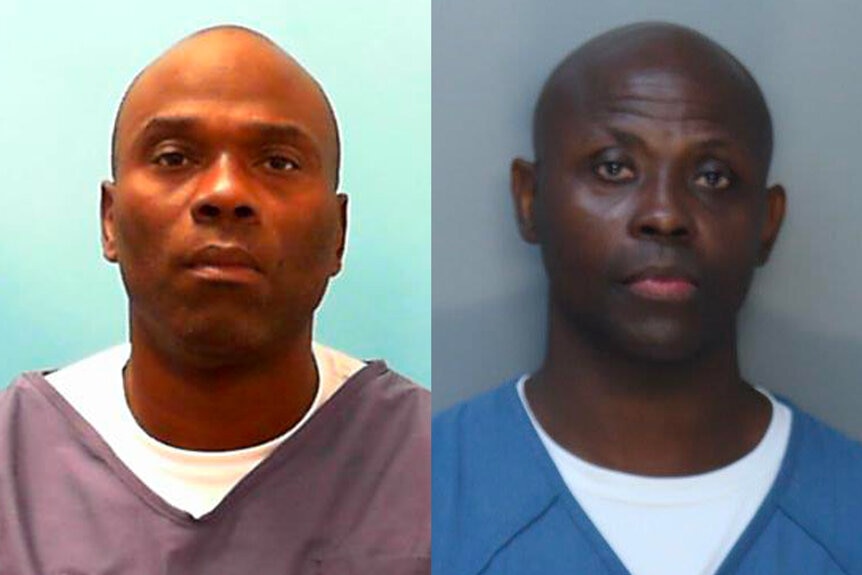Create a free profile to get unlimited access to exclusive videos, breaking news, sweepstakes, and more!
Florida Man Who Spent 32 Years In Prison For Murder He Did Not Commit Savors Freedom, But Wants Compensation
A case of mistaken identity keep Thomas "Jay" James in prison for decades for a murder he didn't commit. Now, a prior felony conviction is preventing him from getting compensation.

A case of mistaken identity kept Thomas Raynard James, known as “Jay,” to family and friends, in the Florida prison system for more than 30 years for a murder he did not commit. Released nearly three months ago on April 27, Thomas is still adjusting to freedom.
“Freedom, I’d be at a lost for words if I tried to describe it. There are no words in my vocabulary that can describe the feeling, that euphoric feeling that I get from being free after being locked up,” James told Oxygen.com. “I’m still taking it all in, trying to make the best of what has been a bad situation for me. I went in and came out with nothing. I’m starting over.”
On Jan. 11, 1991, James, 23, was convicted of first-degree murder, armed robbery with a firearm, armed burglary of an occupied dwelling with a firearm and assault and aggravated assault with a firearm for the murder of Francis McKinnon, a decorated Korean and Vietnam War veteran. The father of seven suffered from post-traumatic stress disorder, his sons said, according to the Miami Herald.
On Jan. 17, 1990, two men, one wearing a ski mask, entered the apartment in Coconut Grove. McKinnon was at home with his wife and three stepchildren. One of the gunmen fired his weapon into McKinnon’s head. He died instantly.
Two names emerged as possible suspects: Thomas James and “Dog,” later identified as Vincent Williams. Two people identified Thomas Raynard James as the man who shot McKinnon, including McKinnon's stepdaughter Dorothy Walton. The other witness claimed to have seen James running from the apartment but failed to identify him as the shooter in court. Walton maintained for decades that James killed her stepfather.
“Just as I was born into this world, I will not forget that man’s face,” she told the Miami Herald back then. “I looked into his eyes. He knows it.”
There was no physical evidence connecting James to the crime. Walton was the state’s star witness.
James only avoided the death penalty because one of the prosecutors recommended against it. RoseMarie Antonacci-Pollock wrote in a memo: “I am extremely concerned about the very weak nature of the state’s evidence in this case,” according to GQ.
James languished in prison for decades, proclaiming his innocence, writing letters to witnesses, and acting as his own attorney, filing multiple appeals.
His pleas were mostly ignored until two things happened: an article about his case appeared in GQ, and attorney Natlie Figgers, based in Coral Springs, agreed to review his case. Additionally, James’s cousin, Santay Thompson, and her daughter, Sankavia Offord, created flyers, started posting about his case on social media, and created a YouTube channel.
“[Natlie] is my shero. Santay is my angel,” James said. He affectionally calls Offord his “small but mighty mouthpiece.”
Thompson said the family never wavered in its belief that James was innocent.
“We know Jay. That’s not something he was ever into. He’s a giver, not a taker,” Thompson told Oxygen.com.
Figgers did not have a background in criminal law. In fact, she was only two years out of law school and nine months pregnant – two weeks from her due date -- when she agreed to review the case.
They initially connected when people trying to help James reached out to the Figgers Foundation, seeking funds for a defense team. The foundation was unable to provide aid, but Figgers offered legal assistance.
At that time, she specialized in business and personal injury cases.
“I told them, I’m not a criminal attorney, but if everything you’re saying is true, I will definitely help him, if I can,” Figgers told Oxygen.com. “I just wanted us to have an understanding because his case was so serious. I just wanted to let him know this wasn’t my area of expertise, but I’m going to need you to trust me.”
James said that Figgers agreeing to review his case was an answer to his prayers.
“It’s something I had been looking for -- for a long time, for like 30 years,” James said. “The whole time, my goal was not to get anybody to believe what I was saying, but to accept, to admit that if what I was saying was true, that I had been wrongly convicted. But in order to do that or to reach that conclusion, you have to look into the facts," he told Oxygen.com.
That was in 2020.
After logging more than 2,000 hours on the case, going door-to-door interviewing dozens of people, Figgers reached out to the state attorney’s Justice Project. The Innocence Project of Florida had reviewed James’s case twice, but ultimately passed on it.
James was freed after Katherine Fernandez Rundle, state attorney of the Eleventh Judicial Circuit, filed a 90-page motion asking the court to vacate his conviction and sentencing. The Justice Project with the State Attorney’s Office spent a year reviewing the case.
“In the final analysis, at best the evidence that the defendant committed the crime is unclear and unconvincing, and at worst it is just plain wrong,” prosecutors wrote. “The State concludes that Thomas Raynard James is actually innocent and should be exonerated of the charges.”
Over the years, Walton began wavering in her certainty that James was the killer. After an emotional and tense meeting with Figgers, she admitted that he did not kill her stepfather.
“When I went to interview her, she cracked the door open. I knew at that time she was giving me an opportunity to show her why she should do the right thing. It was such emotional point for me, I couldn’t help but cry to her,” Figgers said.
“I told her, ‘If God tells you to give me a call when I leave, please give me a call. I’m going to answer. But I’m doing this because he is an innocent person. And I’m doing this because God put me here,” Figgers told NBC News.
She got a call about 10 minutes after she left.
“I was driving. I pulled over. She asked me: ‘Why did you cry like that? Who is he to you? Are you related to him? I told her no. She asked, 'Is he paying you? I said, ‘No. I’m doing this pro bono.’ She asked how did I know it wasn’t him? I said, ‘Because I know.’ And she said, ‘I know it wasn’t him, too.’”
In April, Walton said in a sworn statement to the State Attorney’s Office that James was not the killer. The state moved to drop the case after James passed a polygraph test, which is not admissible in court.
They also interviewed the other Thomas James, who it turns out was in prison on the night of McKinnon’s murder. He told GQ that he knew about the robbery and cased the apartment before the shooting. He told the magazine that Thomas Raynard James was not the killer.
“I know the other Thomas James was arrested by accident, by mistake,” he told GQ. “The officers were looking for me.”
Thomas told the Justice Project that because Thomas Raynard James was a drug dealer they would have “targeted and robbed him,” prosecutors wrote.
Another possible suspect died in 2020.
Prosecutors concluded that James spent more than half his life in prison because of a case of mistaken identity.
James, now 55, and living with his mother in the Miami area, is fighting to get compensation from the state of Florida. He refers to the state’s criminal justice system repeatedly as the “criminal injustice system,” in his recently published book, If The Walls Could Talk: Would You Listen?
“It’s called the Sunshine State, but there’s a dark cloud hanging over it,” he said.
Typically, if an individual is wrongly convicted in the state of Florida, they are entitled to $50,000 for every year spent behind bars. The maximum is $2 million. James would be entitled to $1.6 million, but he has a prior felony conviction, which means he is not eligible for money under the state’s Clean Hands Provision.
“Every person, place, or thing is held accountable for its victimization, except Florida and its criminal 'injustice' system. It can kidnap and falsely imprison an individual, ostracize him from his freedom, family, and friends, and violate his constitutional, civil, and human rights,” James writes in his book. “Florida exemplifies a total disregard for the psychological trauma suffered by one who is innocent but incarcerated.”
Figgers said they are working on possibly changing the law or filing a federal lawsuit.
James has other plans as well. He wants to write more books, design a clothing line, and help others wrongly convicted.
Figgers' office has been overwhelmed with cases of people wrongly convicted. She wants to help everyone that she can.
James family has created a GoFundme page and a petition seeking monetary compensation. There’s also the website, Justice For Jay.
“It was terrible. It’s still terrible. The fight is not over,” Thompson said. “They took his life away and then threw him out without anything, so every day is still a struggle.”
Thompson said her cousin is losing the sight in his left eye because his glaucoma was not treated properly while he was in prison.
James is savoring his freedom, but he’s also a man with a big mission.
“I’m not bitter. I’m not angry. I realize that the system is broken and because I recognize it and apparently nobody else has, I feel it’s my duty. I owe it to society and my community to try to right it. So, I’m going to work on that,” he told the Florida Sun-Sentinel.















